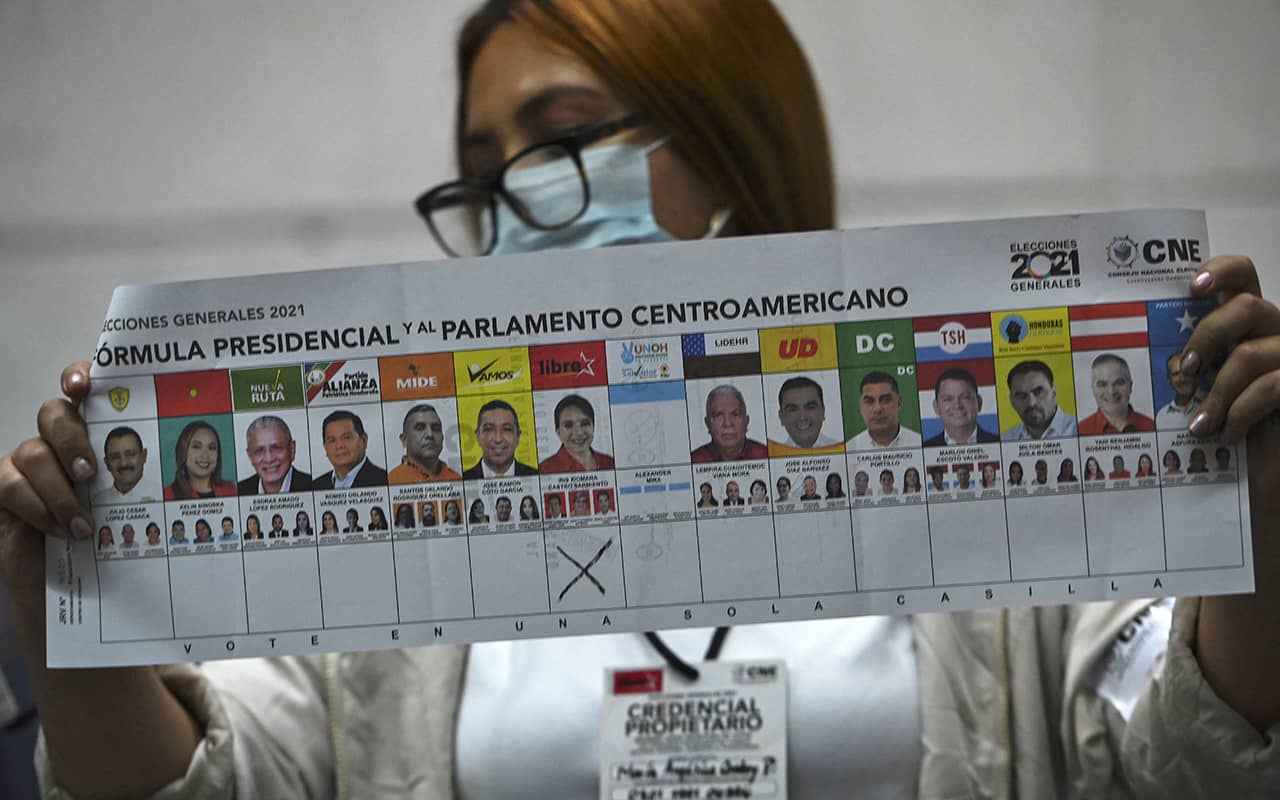The top presidential candidates in Sunday’s Honduran general election appealed for peace as polls closed in an expected tight and tense vote to see who will replace Juan Orlando Hernandez, a controversial figure accused of drug trafficking in the United States.
Reports of intimidation and violence in the buildup led to fears the election could spark the same unrest that broke out four years ago after Hernandez won a second successive term amid accusations of fraud.
More than 30 people died as authorities cracked down on a month-long protest. “We want this to be a civic event, in peace and tranquility,” said leftist Xiomara Castro, the frontrunner in last month’s opinion polls who would be her country’s first female president.
“Peace and tranquility are priceless, and listen to me well: not one drop of blood is worth it,” added Nasry Asfura, the mayor of Tegucigalpa and candidate for the ruling right-wing National Party (PN). More than five million people were registered to vote and Kelvin Aguirre, president of the National Electoral Council (CNE), said turnout had been “massive.”
Polls closed at 5:00 pm (2300 GMT) but those already queueing were still allowed to vote. The opposition has expressed fears that the poll may be rigged to keep the PN in power, which would almost inevitably prompt street protests.
“If the PN wins the election, even legitimately, there will be a worrying level of violence,” political analyst Raul Pineda, a lawyer and former PN lawmaker, told AFP. “It’s worrying,” Luis Gomez, 26, told AFP from the gang-ridden Tegucigalpa neighborhood of La Sosa. “I live day to day (and) it would hurt us if there were disturbances.”
Preparing for war
The country has been hit hard by gang violence, drug trafficking and hurricanes, with 59 percent of the 10 million people living in poverty.
“A kind of paranoia has developed, people are preparing for war” by stocking up on food and water, said Pineda. But he said pressure from Washington — which wants to reduce triggers for Central American mass migration to the United States — along with the presence of international observers should ensure a transparent vote.
“Regardless of who wins, we’re brothers, we’re all Hondurans and need to respect each other,” said carpenter Leonel Pena, 57.
The crucial moment will come three hours after polls close when the CNE is due to announce early results, Gustavo Irias, executive director of the Center for Democracy Studies, told AFP. Some 18,000 police and as many soldiers are on duty nationwide.
Early voting, at least, transpired calmly in the capital. “We’ve tried this government for 12 years and things have gone from bad to worse,” said Gomez. “We hope for something new.” The PN has portrayed Castro, of the LIBRE party, as an authoritarian communist.
“We don’t want the Venezuelan dictatorship here in Honduras,” said Rosa Diaz, 31, a homemaker in a middle-class neighborhood who is supporting the PN. “What communism? Here in Honduras, if you don’t work, you don’t eat,” scoffed Guadalupe Rodriguez, 54, a street vendor in a poor neighborhood.
No narco-states, only narco-governments
The PN has been in power since Manuel Zelaya — Castro’s husband — was ousted in a 2009 coup supported by the military, business elites and the political right.
Corruption and drug-trafficking scandals have engulfed Hernandez and many in his inner circle. Hernandez’s brother Tony is serving a life sentence in a US prison for drug trafficking. Drug barons who the president helped extradite to the US have accused him of involvement in the illicit trade.
Asfura was accused in 2020 of embezzling $700,000 of public money, and the so-called Pandora Papers linked him to influence-peddling in Costa Rica. The third major candidate of 13 in the presidential race, the Liberal Party’s Yani Rosenthal, spent three years in a US jail for money-laundering. “Honduras is internationally known as a narco-state. But there are no narco-states, only narco-governments,” said analyst Pineda.
Jump in unemployment –
For many voters, the main issue is jobs.
Unemployment jumped from 5.7 percent in 2019 to 10.9 percent in 2020, largely because of the coronavirus pandemic, according to a study by the Autonomous University.
The country was also ravaged by two hurricanes in 2020. “I want prosperity for us, employment, education,” said Elizabeth Romero, 75, a domestic worker from La Sosa.
Elvin Aguilar, 32, who was begging for money at a traffic light with his infant daughter in his arms, said he hoped the new government would provide “work and everything else.” Hondurans also voted to elect the 128 members of the National Congress and 20 representatives of the Central American parliament.
by Barnaby CHESTERMAN






